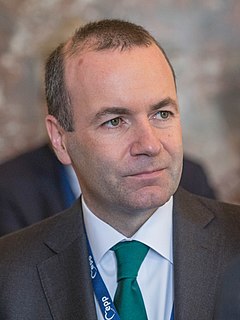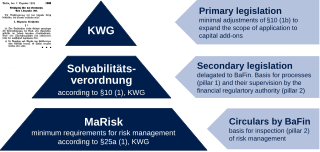
Financial regulation is a form of regulation or supervision, which subjects financial institutions to certain requirements, restrictions and guidelines, aiming to maintain the integrity of the financial system. This may be handled by either a government or non-government organization. Financial regulation has also influenced the structure of banking sectors by increasing the variety of financial products available. Financial regulation forms one of three legal categories which constitutes the content of financial law, the other two being market practices, case law.

Critical infrastructure is a term used by governments to describe assets that are essential for the functioning of a society and economy – the infrastructure. Most commonly associated with the term are facilities for:
Operational risk is "the risk of a change in value caused by the fact that actual losses, incurred for inadequate or failed internal processes, people and systems, or from external events, differ from the expected losses". This definition, adopted by the European Solvency II Directive for insurers, is a variation from that adopted in the Basel II regulations for banks. In October 2014, the Basel Committee on Banking Supervision proposed a revision to its operational risk capital framework that sets out a new standardized approach to replace the basic indicator approach and the standardized approach for calculating operational risk capital.
In a U.S. publicly traded company, an audit committee is an operating committee of the board of directors charged with oversight of financial reporting and disclosure. Committee members are drawn from members of the company's board of directors, with a Chairperson selected from among the committee members. A qualifying audit committee is required for a U.S. publicly traded company to be listed on a stock exchange. Audit committees are typically empowered to acquire the consulting resources and expertise deemed necessary to perform their responsibilities.
Basel II is the second of the Basel Accords,, which are recommendations on banking laws and regulations issued by the Basel Committee on Banking Supervision.
A capital requirement is the amount of capital a bank or other financial institution has to hold as required by its financial regulator. This is usually expressed as a capital adequacy ratio of equity that must be held as a percentage of risk-weighted assets. These requirements are put into place to ensure that these institutions do not take on excess leverage and become insolvent. Capital requirements govern the ratio of equity to debt, recorded on the liabilities and equity side of a firm's balance sheet. They should not be confused with reserve requirements, which govern the assets side of a bank's balance sheet—in particular, the proportion of its assets it must hold in cash or highly-liquid assets.

Manfred Weber is a German politician who has served as Leader of the European People's Party in the European Parliament since 2014. He has been a Member of the European Parliament (MEP) from Germany since 2004. He is a member of the Christian Social Union in Bavaria, part of the European People's Party.
The Dangerous Substances Directive was one of the main European Union laws concerning chemical safety, until its full replacement by the new regulation CLP Regulation (2008), starting in 2016. It was made under Article 100 of the Treaty of Rome. By agreement, it is also applicable in the EEA, and compliance with the directive will ensure compliance with the relevant Swiss laws. The Directive ceased to be in force on 31 May 2015 and was repealed by Regulation (EC) No 1272/2008 of the European Parliament and of the Council of 16 December 2008 on classification, labelling and packaging of substances and mixtures, amending and repealing Directives 67/548/EEC and 1999/45/EC, and amending Regulation (EC) No 1907/2006.

The conservation status of a group of organisms indicates whether the group still exists and how likely the group is to become extinct in the near future. Many factors are taken into account when assessing conservation status: not simply the number of individuals remaining, but the overall increase or decrease in the population over time, breeding success rates, and known threats. Various systems of conservation status exist and are in use at international, multi-country, national and local levels as well as for consumer use.
The Markets in Financial Instruments Directive 2004/39/EC as subsequently amended is a European Union law that provides harmonised regulation for investment services across the 31 member states of the European Economic Area. The directive's main objectives are to increase competition and investor protection in investment services. As of the effective date, 1 November 2007, it replaced the Investment Services Directive (ISD).

International Standards on Auditing (ISA) are professional standards for the performance of financial audit of financial information. These standards are issued by International Federation of Accountants (IFAC) through the International Auditing and Assurance Standards Board (IAASB). According to Olung M ISA guides the auditor to add value to the assignment hence building confidence of investors.
The Landfill Directive, more formally Council Directive 1999/31/EC of 26 April 1999 is a European Union directive that regulates waste management of landfills in the European Union. It was implemented by its Member States by 16 July 2001.

BSI Group, also known as the British Standards Institution (BSI), is the national standards body of the United Kingdom. BSI produces technical standards on a wide range of products and services, and also supplies certification and standards-related services to businesses.
The Capital Requirements Directives (CRD) for the financial services industry have introduced a supervisory framework in the European Union which reflects the Basel II and Basel III rules on capital measurement and capital standards.
The Solvency II Directive is a Directive in European Union law that codifies and harmonises the EU insurance regulation. Primarily this concerns the amount of capital that EU insurance companies must hold to reduce the risk of insolvency.
ISO 14971 is an ISO standard for the application of risk management to medical devices. The ISO Technical Committee responsible for the maintenance of this standard is ISO TC 210 working with IEC/SC62A through Joint Working Group one (JWG1). This standard is the culmination of the work starting in ISO/IEC Guide 51, and ISO/IEC Guide 63. The latest significant revision was published in 2007 with a minor update published in 2009. In 2013, a technical report ISO/TR 24971 was published by ISO TC 210 to provide expert guidance on the application of this standard.
The Alternative Investment Fund Managers Directive 2011/61/EU is an EU law on the financial regulation of hedge funds, private equity, real estate funds, and other "Alternative Investment Fund Managers" (AIFMs) in the European Union. The Directive requires all covered AIFMs to obtain authorisation, and make various disclosures as a condition of operation. It followed the global financial crisis. Before, the alternative investment industry had not been regulated at EU level.
The Capital Requirements Regulation (EU) No. 575/2013 is an EU law that aims to decrease the likelihood that banks go insolvent. With the Credit Institutions Directive 2013 the Capital Requirements Regulation 2013 reflects Basel III rules on capital measurement and capital standards.









